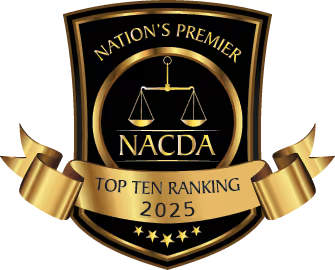
Child Abuse Defense Attorney
Defending Against Accusations of Child Abuse in Seattle
When you’ve been accused of child abuse, it can feel like your world is crumbling around you. The fear, the shame, the uncertainty about your future — we understand how overwhelming it all is. But it’s important to remember that an accusation isn’t a conviction, and that you have the right to a strong defense.
At Marshall & Saunders, we've stood beside many people facing these devastating charges. We know the emotional toll it can take not just on you but on your entire family. That's why we approach each case with compassion, discretion, and an unwavering commitment to your best interests.
We've seen how these cases can inflame emotions in prosecutors, juries, and even judges. But we've also learned how to navigate them effectively, presenting the whole of who you are clearly and compellingly.
Our firm handles the full spectrum of child abuse defense. Whether you're facing charges of physical abuse or sexual abuse, such as child molestation or rape of a child, Marshall & Saunders has the experience and dedication to mount a strong defense on your behalf.
You're not alone in this. Reach out to our firm today to talk about your situation and start building your defense.

What Qualifies as Child Abuse?
The Essence of Child Abuse Accusations
Accusations of child abuse often hinge on the testimony of the child involved or an adult who cares for them. This presents several unique challenges, such as:
- Child witnesses: The child alleging to have been assaulted is usually a key witness. Their statements, both during the initial investigation and at trial, are often crucial evidence. An attorney often needs to be able to show that a child is lying or misremembering without looking like a bully in the eyes of the jury.
- Interview sensitivity: Interviewing children about potential crimes is a delicate task. Even trained professionals can inadvertently influence a child's recollection.
- Confirmation bias: Interviewers may unconsciously seek information that supports the accusation while overlooking contradictory evidence.
- False memories: Children can sometimes come to believe suggested information as fact, even if it didn't actually happen. Their memories may feel genuine but be false.
- Legal complexities: There's a special body of law governing how children's statements can be used as evidence.
Our attorneys know these challenges well.
We've studied the science of memory formation, and regularly attend lectures and speak with psychologists to understand the latest research. We’re also familiar with the best practices for child interviews and can identify when they haven't been followed. When necessary, we bring in leading experts in forensic interviewing and psychology to help juries understand the problems with a child's testimony.
Washington Law on Assault of a Child
In Washington, Assault of a Child is a serious offense. Anyone who’s 18 years or older and harms a child 13 years old or younger can be charged with this crime. The severity of the charge typically depends on the circumstances of the assault, the intent of the person committing it, and the extent of the resulting injuries.
The law generally classifies injuries to a child in one of three ways:
- Bodily harm: Physical pain, injury, illness, or impaired physical condition.
- Substantial bodily harm: Temporary but significant disfigurement, temporary but substantial loss of bodily function, or fracture of any body part.
- Great bodily harm: Injury creating a probability of death, significant permanent disfigurement, or significant permanent loss of bodily function.
The type of harm inflicted plays a central role in determining the degree of the charge and potential penalties.
Three Degrees of Assault of a Child Convictions
A defendant may be found guilty of assault of a child in the first degree if they:
- Assault the child with a firearm or other deadly weapon or by any means likely to produce great bodily harm or death.
- Expose the child to poison, HIV, or any other harmful substance.
- Assault the child and inflict great bodily harm.
- Intentionally assault the child and recklessly inflict great bodily harm.
The offense will also be classified as Assault of a Child in the First Degree if the defendant caused substantial bodily harm after having previously engaged in a pattern of assault that caused the child bodily harm greater than brief physical pain, minor temporary marks, or physical pain or agony equivalent to that produced by torture.
A person is guilty of assault of a child in the second degree if they:
- Intentionally assault a child and recklessly inflict substantial bodily harm.
- Intentionally and unlawfully cause substantial bodily harm to an unborn child seen or felt moving in utero by inflicting injury upon the mother.
- Assault a child with a deadly weapon.
- Administer poison or another harmful substance to the child.
- Knowingly inflict bodily harm that causes such pain or agony as to be the equivalent of that produced by torture.
- Assault a child by strangulation or suffocation.
- Intentionally assault the child and cause bodily harm greater than brief physical pain or minor temporary marks.
Lastly, a person is guilty of assault of a child in the third degree if they cause bodily harm to a child:
- By means of a weapon or other instrument.
- Accompanied by substantial pain that extends for a period sufficient to cause considerable suffering.
A person acts with criminal negligence if they “fail to be aware of a substantial risk that a wrongful act may occur,” and their failure in this regard “constitutes a gross deviation from the standard of care that a reasonable person would exercise in the same situation.”
Penalties for a Conviction for Assault of a Child
A conviction for Assault of a Child carries severe penalties, which vary according to the degree of the offense. It’s important to note that these are the maximum penalties — actual sentences are usually lower.
- First degree (Class A felony): Life in prison and a $50,000 fine.
- Second degree (Class B felony): 10 years in prison and a $20,000 fine.
- Third degree (Class C felony): 5 years in prison and a $10,000 fine.
The severity of the sentences often depends on factors such as prior criminal record and number of incidents. Aggravating factors (such as using a weapon) can also increase penalties.
Every case is unique. The specific circumstances of your situation will significantly impact the potential consequences. That's why having experienced legal representation is vital for navigating these complex cases.
Other Consequences of a Conviction for Child Abuse
A conviction for child abuse has far-reaching impacts beyond prison time and fines. The consequences can include permanent loss of custody or visitation rights with your own children, loss of professional licenses and career opportunities, severe housing restrictions, and lasting damage to personal relationships. Many of these effects persist long after completing any sentence, creating lifelong barriers to rebuilding your life. This makes mounting a strong defense essential from the very beginning of your case.
Don’t Go It Alone in This Fight
We understand the fear you must be feeling. Schedule a confidential, judgment-free consultation with our capable legal team today to take the first step toward securing your future.
Key Challenges in Defending Against an Accusation of Assault of a Child
Mounting an effective defense against child assault charges can be tricky. Here are some of the primary areas we focus on:
Child's Statements
The child's testimony is often central to these cases. We carefully examine how the child was interviewed, looking for confirmation bias in the interviewer and the possibility of false memories or suggested information. Understanding the nuances of child testimony is imperative for building a strong defense.
Interview Techniques
Even well-intentioned interviewers can inadvertently influence a child's recollection. Our team will scrutinize the police and prosecution’s adherence to best practices in child interviewing, looking for signs of leading questions or suggestive techniques that could result in false memories.
Medical Evidence
When medical evidence is presented, we engage our own medical experts to review the findings. We're prepared to challenge "non-accidental injury" diagnoses when appropriate and question the credentials and biases of the prosecution’s witnesses.
Many doctors won't testify for a child abuse defendant, but we have strong connections with outstanding physicians nationwide who share our commitment to fair trials.
Other Expert Testimony
We often bring in leading experts in forensic interviewing, child psychology, and memory formation. Their testimony can help juries understand the intricacies of these cases, particularly regarding how false memories can form and how interview techniques can influence a child's recollection.
Defenses We Consider Presenting
When defending clients against charges of child abuse, we investigate to find the strongest theory of the case for you — the strongest explanation of why you have been wrongly accused. Among the defenses we look for are these:
Accidental Injury
Children often get injured during normal play and activities. Our investigators will carefully examine the circumstances to determine whether the injury could have been accidental rather than intentional.
Lawful Discipline
Washington law allows for reasonable and moderate parental discipline. If the assault occurred in a disciplinary context, we can argue that the actions were within legal bounds.
False Memory
If a child is particularly young, they can form a false memory of being abused based on a simple suggestion from another adult. Once the child has formed this false memory, they are often incapable of distinguishing it as false.
Mistaken Identity
In some cases, a child may have been injured by someone else, and the wrong person is accused. As we continue gathering evidence, we’ll scrutinize it thoroughly to ensure that the accused isn't being blamed for someone else's actions.
Medical Conditions
Some medical conditions can mimic signs of abuse. We work with medical experts and other authorities to look for alternative explanations for injuries.


A word from a forensic psychologist
I've never seen anyone prepare child abuse cases for trial as well as David does.


Stand Strong with a Trusted Ally
Child abuse charges can be a heavy burden to bear. You don’t have to bear them alone. Our dedicated team is here to listen without judgment and advocate for your rights and future.

Our Process for Defending Against Child Assault Charges
When you retain the legal services of the skilled team at Marshall & Saunders, we’ll immediately go to work investigating and constructing a robust defense strategy. Here's what you can expect:


Why Choose Us as Your Child Abuse Defense Law Firm?
When you’re having serious accusations leveled at you, you need more than just legal representation. You need a dedicated ally. Here's why Marshall & Saunders is uniquely qualified to stand by you:
- Extensive experience in child abuse defense
- Customized and collaborative defense plans
- Individualized attention and commitment
- Rigorous investigations and relentless advocacy
- Compassionate and non-judgmental support
Speak with one of our accomplished defense attorneys today and see why so many Washington residents trust Marshall & Saunders when criminal charges threaten to tear down their lives.

Your Best Defense Is the Right Legal Team
The allegations you’re facing don’t define you, and you deserve a spirited defense just as much as anyone. The seasoned legal professionals at Marshall & Saunders are here to offer a listening ear and fight fiercely for your rights.
When you’re ready to discuss your case, call us anytime at (206) 826-1400 or complete our convenient online contact form.
901 Fifth Avenue, Suite 2800
Seattle, Washington 98164
You will receive a response from us within 1 - 2 business days.










.webp)
.webp)

